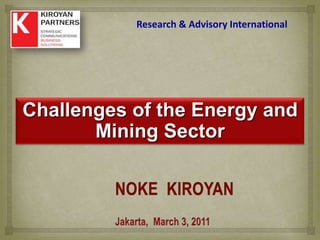
110303 nk rai presentation on mining
- 1. Research & Advisory International Challenges of the Energy and Mining Sector
- 2. Ideology POLITICAL Governments WILL Public Opinion Political Attitude Perception of Good of Community GOAL: Policies and GOOD OF Strategies Economic, Social COMMUNITY and Political Circumstances 2 (Danièle Barberis: “Negotiating Mining Agreements”)
- 3. Year Era Political Will 1945-1950 Revolution No, fighting a war 1950-1957 Early Democracy No, pressing concerns with nationhood 1957-1966 Guided Democracy No! 1966-1998 New Order Yes! 1998-2005 Reformation Basically yes, but there are more pressing concerns 2005-now (?) We’re trying to make up our mind 3
- 4. Mining in Indonesia is susceptible to crisis for various reasons: 1. Identified with environmental destruction 2. Seen as symbol of capitalism 3. Almost invariably involved in clash of cultures 4. Extracting riches from the ground is emotional laden 5. Viewed as associated with the excesses of the “New Order” 6. The public does not differentiate responsible mining practice and illegal mining 7. Rapidly changing social and political environment have direct impact on mining operations 8. Regions demand bigger share of wealth 4
- 5. Susceptibility to crises enhanced by characteristics of many mining companies: 1. Not good at communicating 2. Response to accusations usually technical and defensive 3. Insensitivity to cultural differences 4. Culture of superiority 5. Lack of empathy 6. Reality of regional autonomy slow to sink in 7. Mistaken view of the diminishing role of central government 5
- 6. 1. Land compensation issues (resolved and unresolved) 2. Environmental issues 3. Industrial action 4. Illegal mining 5. Natural disaster 6. Community relations 7. Community development 8. Ethnic conflict 6
- 7. 9. Intercommunity rivalry and jealousy 10. Intra-community rivalry and jealousy 11. Employment 12. Demands of local government 13. Infrastructure use 14. Technical failure 15. Poor governance/ethics 16. Divestment of shares (certain generations of CoW/CCoW) 7
- 8. Origin Mediation/Amplification Organization Resolution Opportunity to influence Difficult to influence Period of increasing Formal constraints awareness Media Coverage Pressure Issue Management Early issue identification Potential Emerging Current Crisis Dormant Development “Risk Issues and Crisis Management: A Casebook of Best Practice” – Michael Regester & Judy Larkin, 2005 8
- 9. 6 WHY 1 does this WHAT threaten the is the organization’s problem? ability to fulfill 5 its mission? WHO 2 WHERE is the target, is this for whom problem occurring? is it a problem? 4 3 HOW WHEN did this did this become a become a problem? problem? (Adapted from “Strategic Public Relations Management: Planning and Managing Effective Communication Programs,” Weintraub Austin, E. & Pinkleton, B.E., 2006) 9
- 10. Central Government Regional Government (Province/ Kabupaten) Business Association NGO Mass Media 10
- 11. Stakeholder Stakeholder Stakeholder Identification Analysis Engagement What corporate Who are our What are their social responsibilities do stakeholders? stakes? we have to our stakeholders? What What strategies, opportunities and actions, or challenges are decisions should presented by our we take to best deal with these stakeholders? responsibilities? (“The Pyramid of Corporate Social Responsibility – Toward the Moral Management of Organizational Stakeholders,” - Carroll, A. B., Business Horizons No. 34, 1991) 11
- 12. To whom does the organization have legal obligations? Who might be positively or negatively be affected by the organizations activities or decisions? Who manifested concern about the issues or impacts? Who has been involved in the past when similar concerns need to be addressed? Who can help the organization address specific impacts? Who can adversely affect the organization’s ability to meet its important objectives? Who would be disadvantaged if they were excluded from the engagement? Who in the value chain is affected? Who may have an impact on the reputation of an organization? Who may influence the policy and regulatory environment in which the organization operates? Who may impact on the value of the organization? (Adapted from “ISO 26000: Guidance on social responsibility.” November 2010 ) 12
- 13. 1 2 1 3 3 0 = Non-Stakeholder 1 = Latent Stakeholder 2 4 2 2 = Expectant Stakeholder 3 3 3 = Definitive Stakeholder 4 = Primary Stakeholder 1 2 1 (“The Primordial Stakeholder: Advancing the Conceptual Consideration of Stakeholder Status for Natural Environment,” - Driscoll, C. and Starik, M. Journal of Business Ethics, Vol. 49, 2004) (“The Natural Environment as a Primary Stakeholder: the Case of Climate Change,” - Haigh, N. and Griffiths, A. Business Strategy and the Environment, Aug 2007) 28
- 14. Menara Karya, 10th Floor Suite H Jl. HR Rasuna Said Blok X-5 Kav. 1-2 Jakarta 12950 – INDONESIA T: +6221 5794 4694 F: +6221 5794 4696 info@kiroyan-partners.com www.kiroyan-partners.com
